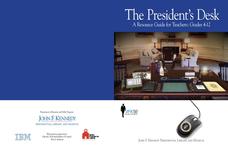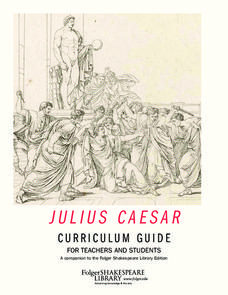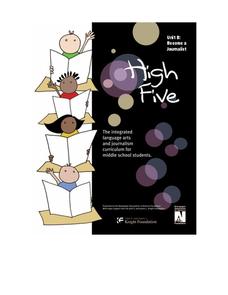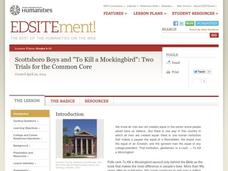Center for Open Educational Resources and Language Learning
Reading Activity
Ready to integrate technology into your ELL instruction? Check out this reading lesson that has language learners using the Internet and apps, joining online book clubs, and creating blogs. A fine model of what can be done.
Illinois State Board of Education
Common Core Teaching and Learning Strategies
Here's a resource that deserves a place in your curriculum library, whether or not your school has adopted the Common Core. Designed for middle and high school language arts classes, the packet is packed with teaching tips, materials,...
US Department of Education
A Close Reading of Lincoln’s Gettysburg Address
Abraham Lincoln's Gettysburg Address provides the text for a series of close reading exercises that model for instructors how carefully crafted guiding questions can help readers think critically about what they read, thus developing...
Idaho State Department of Education
Lessons for Social Studies Educators
Point of view, purpose, and tone: three concepts readers of primary and secondary source materials must take into account when examining documents. Class members view a PowerPoint presentation and use the SOAPS strategy to identify an...
Curated OER
Farewell to Manzanar
Examine human resilience across two texts with a detailed unit. Over the course of a week, learners will conduct a close reading of excerpts from Unbroken and Farewell to Manzanar. The resource includes clear procedures for reading and...
Mr. Roughton
Late Middle Ages Dossiers
Young detectives are given the "clues" to investigate whether King John should be remembered as a poor ruler of England, particularly in comparison in King Richard. They analyze historical informational texts and work in groups to...
iCivics
Propaganda: What’s the Message?
As class members progress through eight fully prepared learning stations, they will identify how bias is present in persuasive media, as well as differentiate among types of propaganda techniques like bandwagon propaganda and the use of...
Staples Foundation For Learning
The President’s Desk
What stories can a desk paperweight and picture frame possibly tell us about the president of the United States? Pupils are transported to the desk of President John F. Kennedy through an engaging interactive site. The guide offers a...
Have Fun Teaching
Identifying Author's Purpose
The multi-lesson, 47-page packet contains everything you need to ensure kids can recognize the clues provided to identify the type of text, the intended audience, and the author's purpose in writing the passage.
Foreign Policy Association
U.S. and Europe Online Lesson Plan
Class groups investigate the economic and political implications of a country's policies on genetically modified foods, craft a position paper detailing that policy, and share their findings with the class. Armed with this information,...
Briscoe Center for American History
Applying the SOAPS Method of Analyzing Historical Documents
Young historians use the SOAPS (Speaker, Occasion, Audience, Purpose, Subject) method of questioning to determine the historical value of primary source documents. The third in a series of five lessons that model for learners how...
Crafting Freedom
Frances Ellen Watkins Harper: Lover of Literacy
This, the sixth in a series of 10 related resources, examines the life and works of Frances Ellen Watkins Harper, an African American author, born in 1825, who advocated literacy for both free and enslaved African Americans.
Crafting Freedom
Harriet Jabocs and Elizabeth Keckly: The Material and Emotional Realities of Childhood in Slavery
Learning how to make accurate inferences by putting together facts found in multiple sources is one of those skills all learners must develop, but one that can be a challenge to teach. This resource is a must-have for your curriculum...
Pasco Middle School
AVID Socratic Seminar
Developed specifically for AVID students, this packet of materials that includes an explanation of the Socratic seminar, the preparation materials, and tips and protocols, is a must-have resource for any class.
Folger Shakespeare Library
Julius Caesar Curriculum Guide
Julius Caesar need not be Greek to kids. The background information and suggestions for teachers, as well as the activities for learners, make this curriculum guide a must-have for your Shakespeare curriculum library.
Online Publications
Become a Journalist
Explore the newspaper as a unique entity with a detailed and extended unit. The unit requires learners to consider the newspaper's role in democracy, think about ethics, practice writing and interviewing, and examine advertising and news...
Greater Clark County Schools
Observations and Inferences
A cartoon from the far side of Gary Larsen's wacky world provides an opportunity for critical thinkers to practice their skills distinguishing between observations and inferences. What fun.
Mr. Roughton
The Maya Files
Class members adopt the role of Law and Order history investigators and examine primary source documents to determine the legitimacy of Marco Polo's claim that he traveled to and traded in China. A cleverly crafted activity that deserves...
Mr. Roughton
CSI: Florence
Who done it? Class groups adopt the role of crime scene investigators and examine exhibits (primary source documents) to determine who attempted to assassinate the members of the Medici dynasty.
National Endowment for the Humanities
Galileo: Revealing the Universe
To gain an understanding of the significance of Galileo Galilei's revolutionary ideas, class members watch the short video "Stargazing Before Galileo," and conduct a close reading of Galileo's Sidereal Messsenger. They then compare...
Curated OER
Youth Emergency Preparedness
What is an emergency, why is preparing for one important, and how can your pupils help others prepare for an emergency? Answer these questions and more with a short unit. Learners will participate in a variety of collaborative,...
National Endowment for the Humanities
The House Un-American Activities Committee
Was the House Un-American Activities Committee justified in investigating subversive influences in the entertainment industry? Part two of the three-part series of lessons that examine the anti-communism movement after World War II,...
National Endowment for the Humanities
Scottsboro Boys and "To Kill a Mockingbird": Two Trials for the Common Core
Here's a must-have resource for anyone reading To Kill A Mockingbird or using Harper Lee's award-winning novel in a classroom. The packet contains Miss Hollace Ransdall's first-hand, factual account of the trials of the Scottsboro Boys,...
Sharp School
The Jungle Project: Creating a Magazine
To conclude a study of Upton Sinclair's The Jungle, groups create a multi-media magazine in which they investigate one aspect of the foods industry. The packet details the requirements for the project, and includes rubrics for assessing...

























